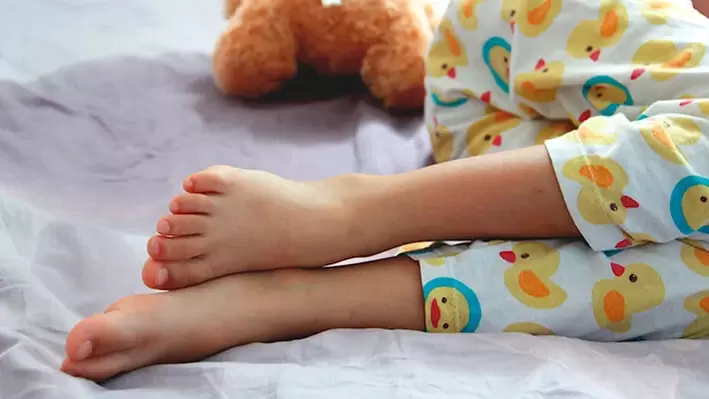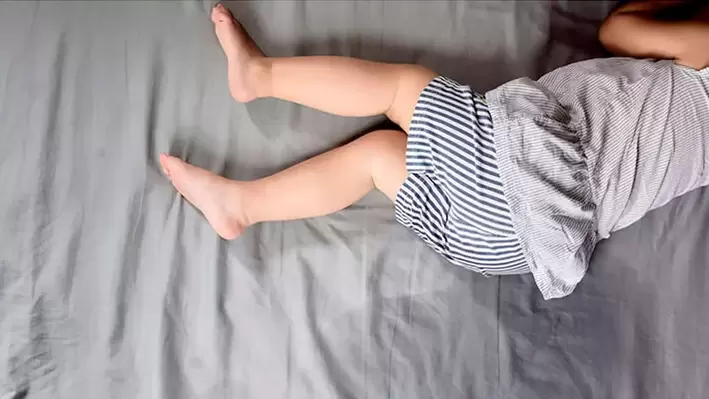Enuresis is a pathology in which one cannot control the bladder. In the majority of cases (more than 95%), we talk about enuree children, when control over urine has not been fully formed. However, the disease is also present in adults (especially the elderly) when the ability to control bladder emptying is gone.
Voluntary urine problems are dominated at night, when someone sleeps (up to 80% of all cases). More often this occurs while awake.
There is no accurate information on the prevalence of the disease, as it is far from the parents to turn to the doctor on this. According to reports, among children 5 years old, enuresis occurs in 5-10% of cases; between 10 years in 3-5%; Among children 15 years of age and older (adult and adolescent enuresis) -1%.

A type of disease
Enuresis is classified according to various parameters. Depending on the main cause of the disease, distinguish:
- The main enuresis. According to statistics, it accounts for more than 90% of cases among children under 5. The main feature of enuresis is the absence of neurological or urological pathology, in which one can develop urinary incontinence. With this form of the disease, children have no long periods of time (from 3 to 6 months), when they wake up. With age, the main part of the enuresis in the structure of the event is reduced. For example, in children 12 years of age or older, about 50%contribute.
- Secondary enuresis. This type of pathology is also called recurrence, as it occurs again after a long period of forgiveness. In this case, there is a relationship with several urological, endocrine or neurological diseases that can contribute to voluntary urine. It should be noted that these various problems may arise after children reach control over urine (however, no earlier than 6 months later).
Depending on the time of manifestation, the disease can be the following type:
- Night enuresis. This is the most common version of the disease that is shown at night. It is considered that urine incontinence can be associated with bladder maturity in children or small quantities. Hormone causes are also possible - for example, low levels of vasopressin. This is a hormone that holds moisture in the body. The disease can also be associated with very strong sleep in children and difficulty with the resurrection.
- Daily enuresis. The form of the disease is less common. It is characterized by the fact that the patient has a problem with the control of the urine during the day.
Depending on the illnesses included and the complications of enuresis, it occurs:
- Not complicated. In this case, the patient has no pathological changes that are provoked by urinary incontinence.
- Complicated. The form of the disease is discussed when it opposes the background of other disorders. For example, these are infections or anomalies in the development of urinary system, nerves and other pathologies.
Enorez Prevention
Parents can recommend some precautions that help prevent the onset of the disease. Such events include:
- Timely treatment of urinary tract infections;
- Control of the amount of fluid used by children during the day, but in this case, it should be considered seasonal and air temperature;
- Baby cleaning and hygiene education. It implies teaching hygiene for the genitals;
- Timely refusal of diapers. Frequently, true diapers -actually stop being used when children reach the age of two;
- If an episode of urinary incontinence persists at night by children to reach the age of six, it is necessary to take steps for a comprehensive examination of the baby, establishing the cause of the disease and treatment.
The reason for the development of this disease
The reason for the development of enuresis is unknown. In this regard, experts present various theories, each have some indirect evidence and, as a rule, are considered in treatment. Consider these theories in more detail:
- Cooking violations. It is considered that voluntary urine at night or day is associated with delays in the development of the human nervous system. In addition, these violations can have organic and psychogenic properties. In the first case, we talk about the direct wounds of some brain structure, spinal cord or peripheral nerves (for example, due to infection). Psychogenic factors can be emotional shock, traumatic experience and more.
- Descent. According to some observations, the likelihood of developing the disease is higher if the parents of the children also experience the disease at one time. Due to this problem, it is difficult to identify such a pattern.
- Hormone theory. The possible cause of night enuresis is a violation of vasopressin secretion. The hormone holds water in the body, and its production increases at night. For this reason, healthy people during sleep are rarely worried about urination. If children have reduced hormone production at night, then this contributes to the development of enuresis. It should be said that such hormone imbalance is observed with some pathology, for example, non -Naichar diabetes.
- Pressure. It is still unclear where the chicken is and where the eggs are. According to observations, many children with urinary incontinence have depressed mental factors and others. For example, the fears that cannot be described, inferior and more. At the same time, when the problem of enuresis is resolved, the patient's mental state often improves. Therefore, it is possible to cast and serve as a factor in one's unstable mental state.
The above theory is mainly concerned about children. For adult enuresis, the violation and the following conditions act here a bad factor:
- Pathology of the nervous system, for example, stroke, damage to the spinal cord, neurogenic bladder and others;
- Urinary system diseases, including kidney failure, prostate gland pathology, decreased pelvic floor muscle tone, frequent urinary tract infections and other diseases;
- Pregnancy, because in this case, the strong pressure of the uterus (especially with the size of the fetus and/or its active movement) is on the bladder.
This problem can also be provoked by taking several drugs, for example, contraceptives.
Symptoms of disease
Enorez's main symptoms are voluntary urine. Often, this occurs at night, but also occurs during the day (while awake). Against the background of urinary incontinence, the following symptoms may also be:
- shame;
- Closure;
- Cricket complexity;
- emotional instability;
- Aggressive behavior (in rare cases).
Adult enuresis can be accompanied by frequent urination (often against the background of some diseases). Due to the weakness of the pelvic floor muscles (which develops with age), urine leakage during movement -cough, cough, and even rest, maybe.
Complication
There are two main groups of complications with enuresis:
- Complications from the soul and nervous system. Most of these are for children. Children feel lower, closed. Some aspects of children's life become inaccessible, for example, travel to camp. Adult enuresis can also cause the problem. All of these are serious factors in the development of anxiety and depression.
- Complications from the organs of the urinary system. The risk of infectious diseases and inflammation of the urinary tract increases. These are cystitis, urethritis, prostatitis and other pathologies, which are characterized by painful urine, atypical discharge from the urethra, as well as pain in the region and lumbar region.
Diagnostics
With enuresis, it is initially recommended to contact a pediatrician (if we talk about children) or therapist. After an initial examination and review, doctors may direct the patient to narrow the urologist, nephrologist, psychiatrist or neurologist.

Diagnosis, as a rule, includes the following events:
- survey and neurological examination;
- Kidney ultrasound and bladder;
- General urine analysis, as well as nechiporenko analysis;
- X -ray lumbar region.
In rare cases, patients are directed to other studies, for example, CT or MRI.
Enoreez treatment
Enoreez treatment is comprehensive. Consider the main components of the therapy:
- Drug treatment. Medications that reduce the amount of urine produced are prescribed. This is a hormone vasopressin analog. Dosage and acceptance mode is selected so that moisture is especially long lasting at night (if we talk about night enuresis).
- How to take fluid and nutrition. The doctor will recommend the use of fluid and the power system. In this case, it is necessary to take into account the diet of children or adults, the level of physical activity, the presence of the same disease and several other factors. In particular, it is recommended to abandon the use of caffein drinks, as they increase diuresis and help take additional fluids. If the patient is playing sports (which means it is actively sweating), then let's accept the increasing amount of fluid.
- Enurant alarm clock. At the beginning of the last century, a special Enuremary alarm clock was developed for the treatment of Enoreez. The first alarm worked on the principle of closing the electrical circuit when the first urine decreased. At the same time, the patient is interrupted by a small electrical release, as one wakes up. Modern enuremation alarm clock is acoustic and is equipped with sensitive moisture sensors. The most common option is the clip attached to the underwear. Once the first urine decreases enter the sensor, the alarm clock works. The task of this treatment is the formation of a reflex "The desire to urinate - the resurrection. " There is also a special sheet with sensors, however, unlike an alarm clip, where the signal is triggered later, when the urine flow has reached the sheet. The effectiveness of night monosymptomatic enuresis treatment with the use of enurular alarm hours is about 70-80%.
Depending on the accompanying disorders, the treatment of enuresis can also be assumed by correction of mental or neurotic disorders. Complex treatment of this problem also provides sessions with psychologists. At the same time, it will not hurt to consult a specialist and parents. Psychology will tell you how to motivate your children properly so that they meet all the doctor's instructions to achieve control over the urine. Children's punishment or the formation of an unprofitable emotional environment in the family (because urinary incontinence) is unacceptable and will only worsen the situation.
Convalescence
As a rule, in children, this pathology occurs after treatment or independently, which cannot be said about adult enuresis (as it occurs in the background of certain chronic diseases). Therefore, recovery is not required after treatment. In some cases, children need classes with psychologists or psychotherapists who will help them socialize if the patient has previously had certain difficulties in psychological nature.
Prevention
There are no specific steps to prevent enuresis. It is important for parents to participate in the problem in the early stages, without waiting for the disease itself. For adults, it may be a precautionary measure in this case:
- timely treatment of bladder disease and other urological pathology;
- active lifestyle;
- Preventive examinations at the doctor, especially after 45 years.

















